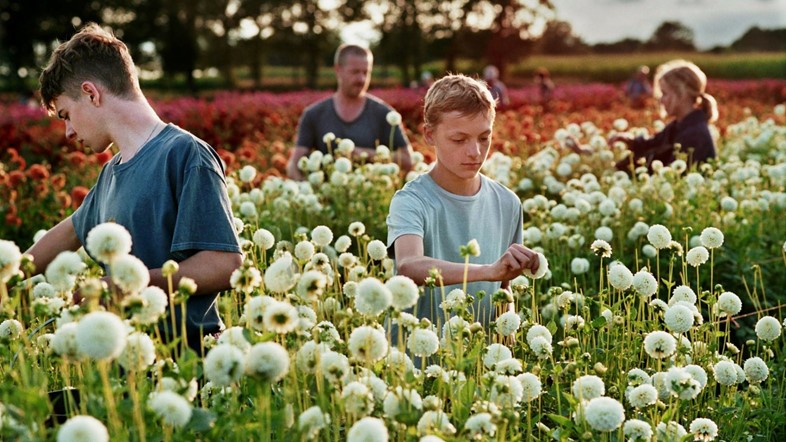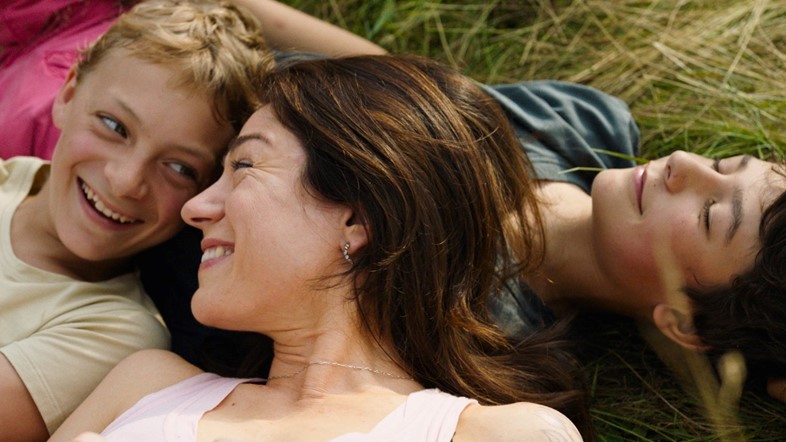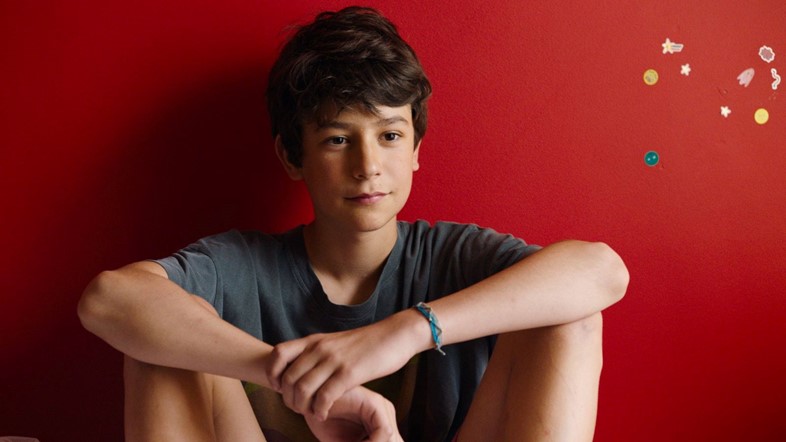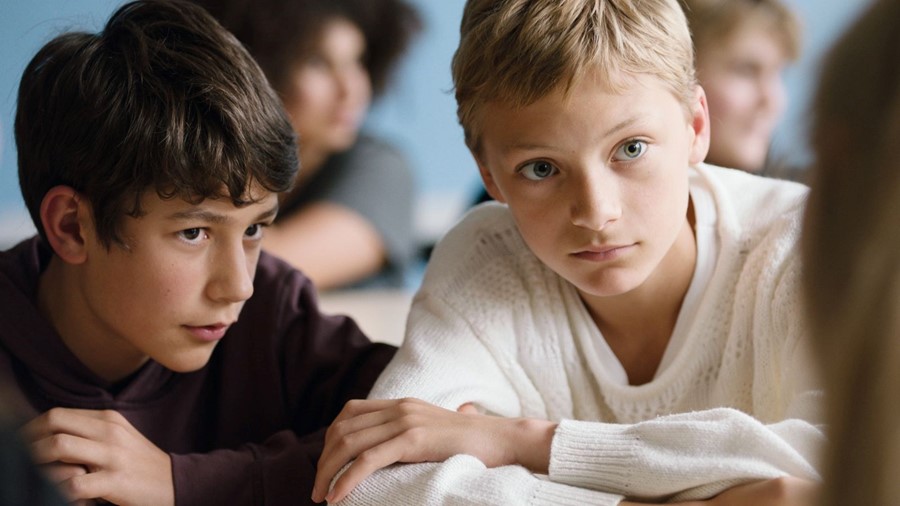Close is a simultaneously gentle and brutal excavation of toxic masculinity. Here, its director Lukas Dhont talks about intimacy, queerness, and violence
When Lukas Dhont was a boy, he was making films about ships. Sometimes the ships were sinking, and sometimes they weren’t, and sometimes there were zombies, but at the core of the Belgian director’s first forays into filmmaking – captured on the borrowed camcorder of his mother’s friend – was a sense of unreality, far removed from his own lived experience. “At 12,” laughs the Belgian director, “the film for which I thought I would be nominated for an Oscar was not about me.”
But life, of course, is rarely as we imagine it at 12, and the film which has earned Dhont his first Academy Awards nod is a deeply personal venture, more about the boy holding the camera than the films he was imagining. Telling the story of two young boys, Léo and Rémi, whose markedly intimate friendship is ruptured first by the suspicions of a deeply gendered world and then by a violent tragedy, Close is a simultaneously gentle and brutal excavation of modern-day masculinity and the intimacies of both affection and grief that play out within its structures.
We spoke with Dhont about queering friendship, crises of loneliness, and the necessity of speaking the language of the heart.
Anahit Behrooz: What struck me most about Close is its depiction of intimacy as a deeply physical experience even between young boys, which isn’t an expression we see often. Why was this emphasis on embodiment so central to you?
Lukas Dhont: I have a very complex relationship with intimacy because I am someone who, at a young age, started to keep people at a distance. I thought I was the only one doing that, and it was only later that I realised that so many of us do. We fear intimacy and it makes us these islands, even in the most powerful relationships.
Also important is that, for the first 12 years of my life, I wanted to be a dancer. And that is an art form in which a lot is expressed in the body. When I write now, I think the dancer inside me is still present and I look at themes from a physical point of view. The physicality of grief is very interesting – as something that impacts the body, as a sort of armour through which nothing can enter and nothing can exit. And then, of course, in every part of the process [of filmmaking], I try to look for a certain sense of intimacy. It’s not about the spectacle. It’s more about those micro things that are sensed that can impact us enormously.

AB: The responses to this film largely split it in two halves: the first half with Léo and Rémi that is very intimate and sweet, and then the tragedy and absence of such intimacy in the second. But it struck me that you are showing a kind of intimacy to grief and loss as well.
LD: Definitely. It’s true in a sense that the dramaturgy of this film is split in half, but when we grieve, it’s so much about the memory of closeness. There’s this lingering [question] of the metaphysical in the second part: is there a possibility of closeness to someone who is not physically there? As an audience member, in the first half, you’re observing a closeness between characters. And in the second half, the film invites you to be close to one character – it becomes an intimate relationship between audience member and protagonist.
AB: This film is, in a way, a small character study, but it also communicates something universal about masculinity and loneliness. I don’t know if you’ve read Olivia Laing’s The Lonely City, but she talks about loneliness as a collective experience, even though it’s something we think we experience in solitude.
LD: Yeah, I am completely in resonance with that. For me, there was this political desire that started this project, and that is also how the film starts: in a bunker, which is a location that is so often linked to masculinity, this place of war. And these boys have that vocabulary and are a part of it, even though their soldiers are imaginary. I think what happens is we tear these young beings apart in this culture that doesn’t validate connection to the heart as much as it does connection to the head. And [that creates] this epidemic of loneliness. That’s why it’s true it’s a collective thing: there’s a reason why we end up with all these men who feel disconnected.

AB: Like you say, it is a loneliness that is deeply gendered. There are so many films depicting female friendship, whereas this kind of portrayal of male friendship is much more rare. Do you think that is part of this same mechanism of masculinity at play?
LD: I feel that we tell young men as they grow up that the place for them to find intimacy is in sex rather than friendship. Women have done a much better job in being there intimately for one another. It’s so hard now, even for me – I have to unlearn that it is not awkward being physically intimate with another man in friendship. I realised as I was writing this film that we are so conditioned to look at closeness between young men as immediately sexual; it was impossible to not be aware that the audience would probably go there, because these images have so often only been presented in connection to male sexuality.
AB: At the same time, there seems to be an interplay between friendship and queerness in this film.
LD: Well, I think for a long time as a society, we grow up learning that a romantic relationship is the main goal. It’s the thing that we have designed our lives towards, and we don’t always see friendship as a mode of living or happiness. And queer people have that sense of connection and community, really, because they have been told they have this otherness, and they find connection amongst each other. For Léo and Rémi, there’s this love that doesn’t have to have a name, that just exists in this very free form. It is just boundless and fluid and pure.

AB: What you’re describing is quite joyful – this sense of community and connection beyond structures – but you use tragedy to explore it within the film. What was it about tragedy as a genre that drew you to these ideas?
LD: For me, it is about confronting violence. We are so often focused on the violence done to others, but for so many of us this creates a war on the inside, one that is more taboo. We need to destigmatise talking about it; I feel it as a drive or necessity to not avoid the theme of violence. When we tell young men not to validate authentic connection, we ask them to become performers – we rupture not only their connections but also their connectedness to the language of the heart. It’s interesting what you said about collective loneliness because we create this epidemic of loneliness in this masculine universe. And because of this tragedy, there is no easy way out. There is no possibility not to confront it. There’s the first half that will never last long enough. And then we are reminded of what happens when brutality seeps in.
Close is out in UK cinemas now.
